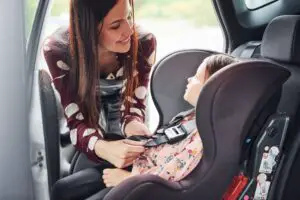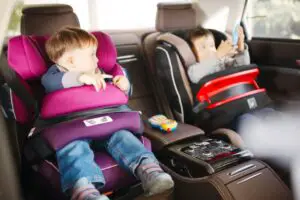Traveling with children can be difficult. Sometimes they can be loud, and sometimes they need your attention, but most of the time, all they need is protection.
Therefore I cannot stress how important it’s for you to go through this article to learn about the car seat laws governing the state.
Car seat laws in Virginia are set to be followed for the safety of your children who need protection at a young and fragile age.
Children under three will use a rear-facing seat, children over 3-4 will use a front-facing seat, and children over 7-to 9 will use a booster seat.
Though these rules are easier said than done, several other requirements must be followed.
For example, their weight must be under or near 20 pounds to use a rear-facing seat, over 35 for a front-facing seat, and finally over 40 to 80 pounds to use a booster seat, with a height of 4 feet and 9 inches.
Table of Contents
- 1 Virginia Car Seat Requirements By Ages
- 2 Car Seat Weight And Height Requirements In Virginia
- 3 Type Of Car Seat Laws In Virginia
- 4 When Is The Time For My Child To Sit In The Front Seat In Virginia?
- 5 What Happens If You Leave Your Child In A Car In Virginia?
- 6 Taxi Car Seat Laws In Virginia
- 7 Virginia Law Regarding Car Seats In Accidents
- 8 Uber Car Seat Laws In Virginia
- 9 Conclusion
Virginia Car Seat Requirements By Ages

Generally, children under 7-8 are held strictly by these rules in Virginia.
However, I will go through with the requirements until ten years of age, along with the height and weight requirements, as the seat manufacturers have clearly stated.
I have assembled them in such a way that you can easily identify the rules based on your child’s age.
I also request you to read the complete article as there might be some new pieces of information that you might not already know.
1 Year Old
As long as they are less than 35 pounds, a year old is supposed to use a rear-facing seat in Virginia.
2 Year Old
Provided that they are under 35 and near 20 pounds, they will use a rear-facing seat as well, as it provides the best protection for them.
3 Year Old
If a 3-year-old is over 35 pounds in Virginia, they can switch to a front-facing seat, but if they are below, they will continue using a rear-facing seat.
4 Year Old
Four year olds will be expected to use a front-facing seat as long as they are over 40 pounds.
5 Year Old
Five year olds will be treated the same way. They will be using a front0facing seat as long as they are in the 40-65 pounds weight area.
6 Year Old
If your child has turned 6, over 40, and under 80- pounds, they will use a front-facing seat.
7 – 9 Year Old
Seven-year-old children will use a front-facing seat in Virginia, but as soon as they are eight, they can use a booster seat provided they are over 65 pounds and are at least 4 feet and 9 inches or lower.
Nine-year-old shall be treated the same way with a booster seat and height requirement.
10 Year Old
Ten-year-olds will have to use a booster- seat to boost their heights to learn how to use a regular car seat.
Car Seat Weight And Height Requirements In Virginia

Infants must be seated on a rear-facing seat roughly from age 1 to 3.
Once they are over that stage in Virginia, they will have to use a front-facing seat until they are over 6 to 7 and have a weight higher than 40 pounds, with a height that is at least 4 feet and 7 inches, after which finally, they shall use a booster seat.
Type Of Car Seat Laws In Virginia
As you might have already read from the article, different seats should be used by different-aged children.
Hence the rules are different too. For you, I have gone through the trouble of arranging them based on the seating types as well.
1. Rear Facing Car Seat
Infants must use these seats. Children under three would be a perfect fit for these seats.
They must be less than 35 pounds to sit comfortably, and they shall hopefully be protected in a case of an accident or any unfortunate driving incident.
2. Forward Facing Car Seat
Four-year-old or older children best use these seats. These are meant to be a way to face them forward, and they act as a transition for children.
They also come with multiple features for safety, for example, a 5-point harness system. Get the best federally approved seat for your child to ensure their well-being.
3. Booster Seat
A booster seat is simply a seat that adds height to your children’s height while sitting in a car, exactly like how some people wear heels, but in this case, their torso gets a height upgrade.
This is done to help them learn how to sit in a car without extra features and just a few belts for their safety until they can change to a normal seat.
When Is The Time For My Child To Sit In The Front Seat In Virginia?
According to the law in Virginia, your child can sit in front as early as 8.
However, to be extremely sure, do not let them sit in front until or unless they are 13 years of age, even though it states that an 8-year-old can sit in front.
It is greatly important to note that child at the age of 8 is still weak and requires protection, and they may not be able to withstand the effect of an airbag right on their fragile body.
Therefore, make sure that they are sitting in the rear for the sake of their life and your happiness.
What Happens If You Leave Your Child In A Car In Virginia?
In general, if a child is found alone in a car in Virginia and appears stressed or in need of assistance, the person responsible will most likely be prosecuted under the law and fined.
However, strictly speaking, in terms of law, there are no laws that protect children when they are left alone in the car, but as a responsible parent, you must ensure that they are never left unsupervised in a car.
Taxi Car Seat Laws In Virginia
Before traveling in a taxi with your child in Virginia, make sure it has a child seat.
Because the law does not specify who must provide a seat, you should bring your seat for your child, so they can have a safe trip.
The law only states that children under the age of 7 must have a seat arranged for them.
However, a child’s safety is no laughing matter, and these rules must be upheld until they are at least over the age of using a regular booster seat.
Virginia Law Regarding Car Seats In Accidents
Since the law in Virginia does not state who will change the seat after an accident, some seats might survive an accident without a scratch, but you should change them as soon as you can because they might sustain damage that you are unaware of.
Do not leave it to the mercy of the other person to change it for you; do not place your child under the risk of any injury.
Regardless of this, the child is still technically protected, provided that you follow the law and use the seats that are supposed to be used for them.
Uber Car Seat Laws In Virginia
Consequently, for Uber, you are supposed to arrange a seat for your child based on their age, as the law in Virginia states that these vehicles are only allowed to transport a child as long as they are under seven years of age.
Therefore, you can try checking on the app if a car is available with a car seat and if it is not simply, get your own and take it with you.
There should not be any sort of compromises on the health and safety of your child, as these minor rules can go a long way in helping them stay clear of injuries.
Conclusion
Thank you for taking the time to go through such a crucial article for your child’s safety and to stay away from a ticket and, consequently, trouble with the law.
However, these Virginia car seat laws tell you to apply these rules to children under the age of 8.
Please apply these rules to them even after that specified age as they are still young when they hit eight years and need protection, and it would be a wise decision to use a seat until or unless they are at least ten years of age.

I am Tahir Azam, and I have been writing amazing articles for TaxiHack for as long as I can remember. I know everything that is to know when it comes to automobiles and is always on top of industry news and developments. While I am not an expert by any means, I pride myself on knowing the ins and outs of many different problems and, of course, their solutions. The articles on our website are some of the best and well-researched content that you will find, and I spend countless hours making sure this remains to be true. This is why I ask you to take your time out and read some of my articles, especially if you find a topic that resonates with you or is something you are looking into. This way, you will find the perfect mix of information and tips on your desired topic. Learn more about Tahir.



